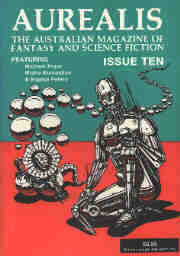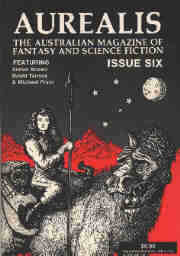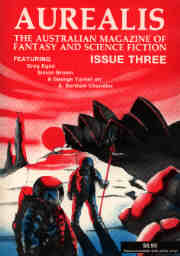Aurealis #14
$6.00
- Editorial – Dirk Strasser
- Rogue – Greg Mellor
- Counterfeit – Ben Winch
- The Silence – Krissy Bland
- The Hunt for Australian Horror – Stephen Paulsen and Sean McMullen
- The Wall – Fanoula Galanakis
- The Blue Stream – Kaaron Warren
- Book Reviews:
Envoy – Shannah Jay
A Place to Fear – G M Hague
Alien Shores – P McNamara & M Winch (Eds) - So, You Want to Be a Book Reviewer – Stephen Higgins
- Cover illustration – Peter Loader
For those of you who can remember our first issue way back in 1990, you would recall the cover design was based on the Aboriginal flag. At the time the artist, Michael Bean, expressed some misgivings about the design after some comments by friends of his. The argument went something like this: Michael Bean had no Aboriginal ancestry, nor did any of the editors of Aurealis, so we therefore had no right to use the Aboriginal flag on the cover of our magazine, no matter how it had been adapted. Furthermore, we were just another group of whites exploiting Aboriginal culture for our own commercial gain. (Let's leave aside for now the argument that the concept of a flag is hardly an Aboriginal one.)
In a recent issue of The Australian SF Writers' News, it was reported that a major publisher rejected a story for an SF anthology which used Aboriginal mythology because it was considered politically incorrect, or at the very least dubious, for whites to appropriate black mythology. One of the arguments offered was that whites distort Aboriginal myths and get them wrong.
There should be some warning bells ringing for all the SF, fantasy and horror writers out there. Writers of speculative fiction in Australia have always used Aboriginal mythology extensively, and the pages of Aurealis have been filled with many at times award-winning stories which feature enigmatic Aboriginals and references to the Dreamtime. Shame on all of you. Shame on all of us. We are all doing more or less what whites have done since they arrived in Australia: we have set about destroying Aboriginal culture. Yes, we should all hang our collective heads. The role call of guilty offenders is a long one, and it features our most illustrious names.
But before we get to far into any orgy of self-flagellation, let's examine the issue a little more closely. Clearly mythology is the staple of the fantasy writer, and it is an important element in much SF and horror as well. The argument is not about using any mythology, it's only about using Aboriginal mythology. And it's actually more specific than that, I believe. It's about white Australians using Aboriginal mythology. Presumably it's okay for white Americans to use Aboriginal mythology. Similarly, while it's anathema for white Americans to use Amerindian mythology, it's all right for white Australians to do so.
Let's think this politically correct proposition through: it is okay for white Australian writers of speculative fiction to use any mythology in their work except Aboriginal mythology. Anglo-Celtic fine, Norse no problem, Amerindian sure, Maori yep, Incan go for it, Innuit why not? Greek yes, Bantu of course, Xhosa okay. But Aboriginal is a big NO.
Let's expose this for the ludicrous and dangerous proposition that it is. I only hope we can put the brakes on this idea before it travels too far. So, we are supposed to be worried that we'll get the Aboriginal mythology wrong, that it won't be authentic, that it won't be the real thing. Well, I have news for all those people out there harbouring these thoughts. Fiction isn't "the real thing". Fiction is made up. Authors play around with ideas, beliefs, images, words, scenes, archetypes, symbols and myths. What makes a story or a novel a writer's own is how he or she plays around with the different elements, how the writer recombines them, how the writer changes them. If authors haven't changed the myth in some way, then they haven't really done what they are supposed to do. In that sense, a fiction writer's basic function is to "get it wrong".
Aboriginal mythology is crucial to Australian speculative fiction. It is one of the important elements which distinguishes it from the American and British versions. Taking it away from us is like taking a hammer away from a carpenter.
Throughout history cultures have always borrowed from each other. Languages, belief systems and mythologies have always been in a state of flux. Of the 1154 human societies, past and present, which have been studied, the most successful artistically have always been those which have borrowed what they found attractive or appealing in other cultures and have adapted it. The real crime doesn't lie in borrowing and adapting but in the systematic obliteration of another culture. The use of Aboriginal mythology in white Australian fiction doesn't obliterate Aboriginal culture, it celebrates it.
So, I urge all of you to fight this form of politically correct censorship whenever you come across it. Stories and novels shouldn't be rejected because there is an unwritten law which states that a writer from culture A cannot borrow from culture B. Either the work is, in the eyes of the editor, good enough to be published or it isn't. An author should not be punished for choosing to borrow from the wrong mythology or belief system.
Salman Rushdie where are you?
Dirk Strasser
Rogue – Greg Mellor
…A CIO stepped into the alley just as the wagon reached sixty k. It took a second for Mas to register the fact and then he knew that something had gone drastically wrong. A CIO was never, but never, sent out to do a routine APO call.
Neon light transformed the part-man, part-machine's spiky hair into a weird scarlet and blue halo. The steel cold eyes were deceptively calm. The assault rifle flashed, and flashed again.
The windscreen and dashboard proved to be no obstacle and quickly melted under the barrage of pulsed energy beams. Gems and jewellery scattered across the front seat, forgotten…
Counterfeit – Ben Winch
…"It's a big scheme, John, with big prospects. We're not hurting anybody."
"We're taking away their lives"
She smiled and patted my hand. "No, we're not, we're improving them. We're giving them new, better lives. It's better than ending up in a sanatorium. This memory erasure has been going on for years in the hospitals. But it had nowhere to go. Those people where left empty we empty them and fill them back up again."…
The Silence – Krissy Bland
The days had now become long and empty every since the Silence dropped. Don't get me wrong, I'm not a negative person, nor is the Silence a bad thing, but it's true, everything has changed. Everyday seems to drag on, containing no excitement, no real joy, nothing, and, now I come to think of it, no real feelings, emotions or events either. At the end of the day when I lie in my warm, snug bed staring at the high, dull ceiling I try to remember the day's events, but my mind goes blank, nothing jumps out as it used to. Everything is one blurred memory and nothing can be clearly distinguished. Whether or not this is all bad I have not yet made up my mind…
The Wall – Fanoula Galanakis
…The fall is almost majestic, almost beautiful until the impact. The car hits the jagged rocks front first, turns and crashes onto the roof. It turns onto its side painfully slowly, and finally clatters to a standstill on what were its wheels. The horrific crunching of steel against rock, and the angry bashing of the waves seem to combine to produce an incredible thunderous booming. Remnants of the utterly compressed vehicle continue to fall towards the hungry ocean the mutilated bonnet, a tyre, a mangled door. Then silence, except for the relentless pounding of the surf…
The Blue Stream – Kaaron Warren
My brother will be home soon. Home from the cool Blue Stream where he has been floating for seven years now, since I was four, and where I will soon be floating. You sink first, a cold, fresh shock, and as you rise you begin to float. It's just like being back in Mum's womb, apparently, only you're there for longer…





